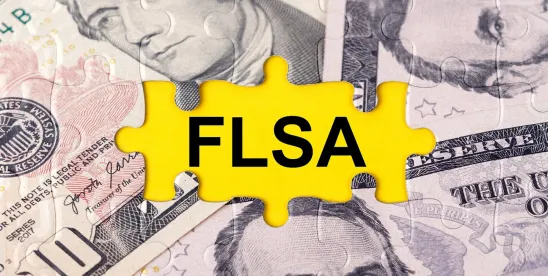In E.M.D. Sales, Inc. v. Carrera (No 23-217), the Supreme Court addressed a circuit split as to the evidentiary standard that applies when an employer argues that an employee is exempt from the minimum-wage and overtime-pay provisions of the Fair Labor Standards Act (“FLSA”). A unanimous Court agreed with the majority of lower courts that this issue should be resolved under the same “preponderance-of-the-evidence” standard that generally applies in civil cases, rejecting the more-demanding “clear-and-convincing” standard applied by a minority of courts.
Since 1938, the FLSA has guaranteed certain protections for employees, including a minimum wage and overtime pay for employees working more than 40 hours per week. But not all employees are eligible for those protections. The FLSA outlines certain categories of exempt employees, including “outside salesmen” who work primarily in the field rather than at their employer’s place of business. An employer bears the burden of proving that an employee falls into an exempt category.
Petitioner E.M.D. Sales is a food-products distributor. Several of its sales representatives sued EMD, alleging that EMD violated the FLSA by not paying them overtime. EMD acknowledged that it wasn’t paying overtime but argued that the sales representatives were “outside salesmen” and therefore exempt from the FLSA’s overtime requirement. After a bench trial, the district court sided with the sales representatives, finding that EMD failed to prove by clear-and-convincing-evidence that the representatives were outside salesmen. On appeal to the Fourth Circuit, EMD argued that the district court should have used a less-demanding preponderance-of-the-evidence standard instead. But the Fourth Circuit affirmed, agreeing with the district court that the clear-and-convincing evidence standard applied. That decision created a circuit split, as every other circuit to consider the issue—including the Fifth, Sixth, Seventh, Ninth, Tenth, and Eleventh Circuits—had applied a preponderance-of-the-evidence standard.
In a unanimous opinion by Justice Kavanaugh, the Supreme Court agreed with the majority rule: To establish that an employee is exempt from the FLSA’s minimum-wage and overtime-pay provisions, an employer needs to satisfy only the preponderance-of-the-evidence standard. Kavanaugh stated that that standard is (and was, at the time of the FLSA’s enactment) “the established default standard of proof in American civil litigation.” While courts deviate from that default standard in some circumstances—when a statute specifies a heightened burden of proof, the Constitution mandates a heightened burden, or the matter involves certain “coercive Government action”—none of these limited circumstances applied to this FLSA dispute. Kavanaugh also analogized FLSA cases to Title VII employment-discrimination cases, in which courts already apply a preponderance-of-the-evidence standard. After concluding that the Fourth Circuit applied the wrong standard, the Court remanded the case to the lower courts to decide in the first instance whether EMD had established that the sales representatives were “outside salesmen” under the proper preponderance-of-the-evidence standard.
Justice Gorsuch filed a one-paragraph concurrence, joined by Justice Thomas. He noted that, unless Congress or the Constitution provides a particular standard of proof, courts must find one by “examining the legal backdrop against which Congress has legislated.” In civil cases, background legal principles typically require proof by preponderance of the evidence, though sometimes common-law rules provide for a different standard. But no matter what the background legal rule is, courts are bound to apply that standard unless Congress or the Constitution forbids it. Since the Court’s opinion was consistent with this understanding, he joined it in full.




 />i
/>i

